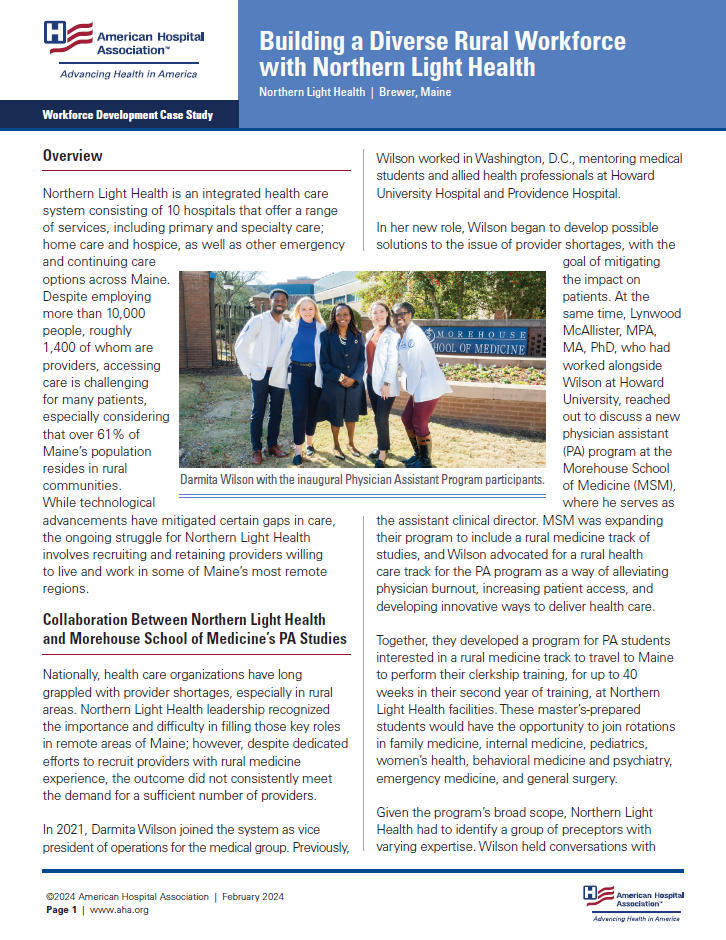Building a Diverse Rural Workforce with Northern Light Health
Northern Light Health is an integrated health care system consisting of 10 hospitals that offer a range of services, including primary and specialty care; home care and hospice, as well as other emergency and continuing care options across Maine. Despite employing more than 10,000 people, roughly 1,400 of whom are providers, accessing care is challenging for many patients, especially considering that over 61% of Maine’s population resides in rural communities. While technological advancements have mitigated certain gaps in care, the ongoing struggle for Northern Light Health involves recruiting and retaining providers willing to live and work in some of Maine’s most remote regions.
Northern Light Health | Brewer, Maine
Collaboration Between Northern Light Health and Morehouse School of Medicine's PA Studies
Nationally, health care organizations have long grappled with provider shortages, especially in rural areas. Northern Light Health leadership recognized the importance and difficulty in filling those key roles in remote areas of Maine; however, despite dedicated efforts to recruit providers with rural medicine experience, the outcome did not consistently meet the demand for a sufficient number of providers.
In 2021, Darmita Wilson joined the system as vice president of operations for the medical group. Previously, Wilson worked in Washington, D.C., mentoring medical students and allied health professionals at Howard University Hospital and Providence Hospital. In her new role, Wilson began to develop possible solutions to the issue of provider shortages, with the goal of mitigating the impact on patients. At the same time, Lynwood McAllister, MPA, MA, PhD, who had worked alongside Wilson at Howard University, reached out to discuss a new physician assistant (PA) program at the Morehouse School of Medicine (MSM), where he serves as the assistant clinical director. MSM was expanding their program to include a rural medicine track of studies, and Wilson advocated for a rural health care track for the PA program as a way of alleviating physician burnout, increasing patient access, and developing innovative ways to deliver health care.
Together, they developed a program for PA students interested in a rural medicine track to travel to Maine to perform their clerkship training, for up to 40 weeks in their second year of training, at Northern Light Health facilities. These master’s-prepared students would have the opportunity to join rotations in family medicine, internal medicine, pediatrics, women’s health, behavioral medicine and psychiatry, emergency medicine, and general surgery.
Results, Lessons Learned and Future Outlook
In November 2023, the program’s first four students completed their rotations with Northern Light Health in family medicine and internal medicine. From the beginning, the students – who volunteered for the program and none of whom had ever been to Maine before – were eager to experience the practicality of their didactic education in the clinical setting. The Northern Light Health preceptors and staff were impressed with how quickly the students acclimated to the clinical setting and their communities and are eager to expand the program to have more PAs as part of the team. The preceptors reported that they have a different outlook on the work they do, feel less burned out and more optimistic about the future of health care.
Wilson shared one of the biggest challenges to date was socializing the value of training the next generation of clinicians and imparting the skills of rural medicine. “As a system, Northern Light Health realizes the importance of proactively developing its own workforce and nurturing the next generation of practitioners. Preceptorship is one positive way to give back to those who are starting their careers, while helping preceptors reconnect to their purpose in caring for others,” Wilson said.
For students, finding their place in the community outside of work is crucial. Northern Light Health prepared them for Maine’s culture, where understanding social cues and adapting to a rural lifestyle takes time. As one student planned their travel to and from their rotations using ride-share transportation, Northern Light Health staff explained that the area only had one ride-share driver. It was an eye-opening transition for students used to an urban environment where these types of services are ubiquitous. It has also given participants a unique insight into the lack of resources in rural communities. One stated, “…during my rotation through cardiology, I noticed that it takes a few months before someone can even receive an echocardiogram. I found this to be a problem because these images provide imperative information that can be used to guide the treatment of patients.” He reflected that even despite these issues, “…it also inspires me to practice in underserved areas and be the resource people need.”
As the early adopter phase, also referred to as phase one, concludes, Wilson’s team is actively working toward the next phase to build a rural medicine hub at Northern Light Health. This expansion aims to accommodate an increased number of students from MSM for clinical rotations in their facilities. Plans for a third phase include developing additional clerkship programs, followed by a mobile unit approach similar to an approach used at MSM in rural Georgia. Northern Light aspires to extend this hub model to other medical schools and programs in rural areas nationwide.


